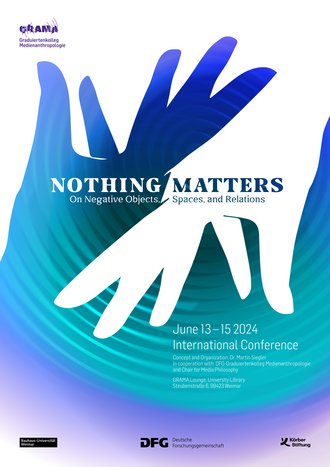Aktuelle Veranstaltungen
Vergangene Veranstaltungen
Nothing Matters. On Negative Objects, Spaces, and Relations

Nothing matters nowadays. Or does it? In the face of severe ecological and geopolitical crises, materiality itself is deeply affected by nothingness and negativity: Landscapes are riddled with holes and voids due to massive resource extraction, mountains of waste pile up as negative matter, glaciers shrink and become monuments of loss.
Thus, we are confronted with a multitude of material non‐things and non‐places. But what relations do we maintain with the void, the absent, the forgotten and the vanished? Through which operations, acts, gestures, and practices is something turned into nothing? How does nothing materialize in various media milieus like film, literature, and games? And what kind of hidden potentialities may lie in material nothingness?
By proposing a material, relational, and operative view on nothing, the conference ties in with recent media‐philosophical concepts like operative ontologies and anthropomediality and brings them into dialogue with interdisciplinary discussions around the negative turn recently announced in contemporary social, geographical, and media theory.
Things Beside Themselves. Mimetic Existences

The concluding conference of the DFG /SNF research group on »Media and Mimesis«3rd – 5th February 2020The conference’s thematic focus on ‘things’ is intended to underline the transhuman, object-oriented dimensions of mimesis, in line with a research approach that is less interested in psychological explanations than in connections and feedback loops between heterogeneous materials, cultural codes, and mimetic practices. It nevertheless does not exclude the being-beside-oneself of human actors, yet conceives the latter as agents of mimetic practices on the basis of an overarching conception of things as processual assemblages of materials, digital and analogue objects, human and non-human actors, and cultural technologies and practices that are capable of initiating desire-driven mimetic economies.
The conference subtitle, ‘Mimetic Existences’, is intended to capture the milieu-specific character of media: as forms of milieux, media function as affordances through which people and things come to be beside themselves. On the basis of a milieu-oriented conception of media, the conference will focus on intermedial mimetic processes, including mimicry and processes of fusion, transformation, and embodiment that operate mimetically between heterogeneous media/milieux.
Link zur Veranstaltungsseite
Das Diorama: Durch...Denken

Internationale Tagung an der Bauhaus-Universität Weimar, 5.-7.12.2019
Die xTagung »Das Diorama: durch … denken« und macht es sich zur Aufgabe, Dioramen als Medien »durch … denken« zu verstehen. Ob Natur oder Geschichte, Kultur oder Biologie, Kunst oder Technik: Dioramatische Formate geben jeweils etwas zur erkennenden Durchdringung frei und stellen ihre Gegenstände und Sujets dabei unter die Bedingungen ihrer je eigenen medienspezifischen und operativen Reflexivität. Dioramen verschränken und krümmen dabei, einer eigensinnigen Geometrie folgend, Flächen in Räume, nehmen Skalierungen vor und beziehen Gegenstände auf Abbildungen und Modelle. Sie unterlaufen die Unterscheidung von Repräsentation und Präsentation. Mit dem thematischen Bezug auf Dioramen, die bisher noch Desiderat medienphilosophischer und ästhetischer Bearbeitungen sind, geht es um einen Rekursions-, Reflexions- und Wissensraum eigener Art, dessen diskursive Verortung selbst noch offen ist.
Die Tagung fand in Weimar statt. Sie wurde vom Teilprojekt »Mimesis des Raumbildes. Das Diorama
als serielle und immersive Mimesis« unter der Leitung von Prof. Lorenz Engell und Prof. Christiane Voss im Salon des Ehemaligen Palais Dürckheim ausgerichtet.
Link zur Veranstaltungsseite
Schalten und Walten. Towards Operative Ontologies

Biennal Conference at the Internationales Kolleg für Kulturtechnikforschung und Medienphilosophie (IKKM), 23.-25. Oktober, Weimar, Germany
Assessing our situation, we cannot ignore the fact that whatever is given in our environment is done so by technical operations and not in the ways natural things exist, by physis, i.e. growing by themselves into being. Things like synthetic organisms do not reveal themselves by their own agency but are called into existence by technology. The ruling (das Walten) of nature as well as the ruling of the social reside under the command of technology, which as increasingly digitized technology is based on switching operations (das Schalten).
The conference concluded the IKKM six-year research program ‘Operative Ontologies’ which was structured along polar, complementary or gradual pairs of operations, which in themselves function as dualities or duplicities. Opening and closing, framing and sewing, appearing and disappearing, coupling and separating, compressing and dispersing, pointing and causing, reproduction and multiplication, or recursion and reflection were each examined as interrelated couples of ontological operations.
Link zur Veranstaltungsseite
Anthropologies of Entanglement

International Conference of the Media Anthropology Centre of Excellence (KOMA) Bauhaus-University Weimar, Germany 9th – 11th October 2019
THe Media Anthropology Centre of Excellence (KOMA) concluded its funding period with an international conference, entering into a dialogue with internationally renowned experts in interdisciplinary anthropological research. In recent decades the field of anthropological research has become more interdisciplinary, as approaches from cultural and media studies have been integrated, as well as those from visual anthropology, feminism, queer theory, ANT, and other fields. Last but not least, the current discourse on the “anthropocene” has stimulated a new reflection of anthropological concepts. Despite all methodological and conceptual differences, the various approaches share the view that the so-called “human nature” can no longer be thought of in an essentialist and ahistorical way. Instead, relational, operative and time- and process-based concepts (e.g. ”borrowed body”, ”cyborg”, ”collectives”, ”extensions of the human body”, ”modes of existence”, “superject” etc.) as well as questions about the cultural and historical situatedness and embodiment of various forms of (human) existence come to the fore. Against this backdrop, the interest has thus shifted to the multitude of cultural, topographical, technical, historical, social, discursive, and media formats with which human existences are entangled.
Link zur Veranstaltungsseite
